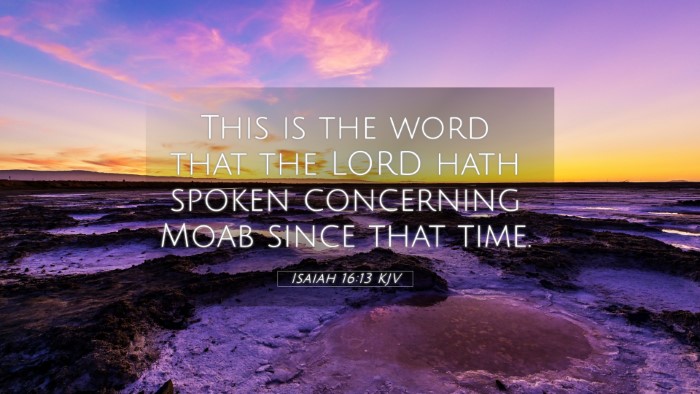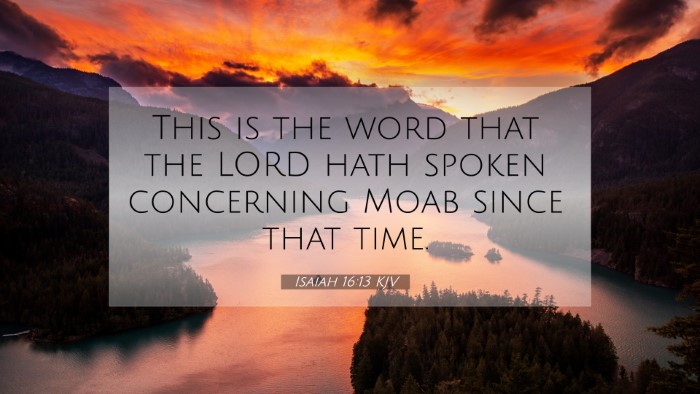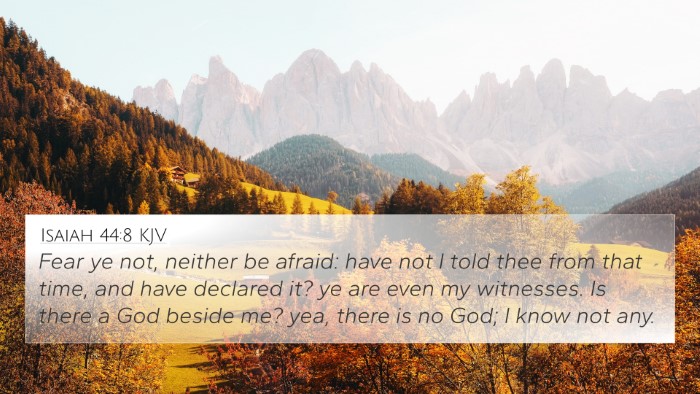Understanding Isaiah 16:13
Isaiah 16:13 states, "This is the word that the Lord has spoken concerning Moab since that time."
This verse comes as part of a prophecy concerning the fate of Moab, illustrating God's sovereignty over nations and His ability to speak into their destinies.
Summary of Insights from Public Domain Commentaries
-
Matthew Henry:
Henry emphasizes that this verse serves as a reminder of God's judgments and plans concerning Moab,
reflecting how the Moabites had turned away from God, thus inviting His divine judgment.
The use of "since that time" suggests a continuation of God’s discourse with His people about Moab’s fate,
indicating a prophetic continuity where God is unwavering in His message.
-
Albert Barnes:
Barnes discusses the historical context of the prophecy, noting how it correlates with the broader narrative
of Israel's relationship with Moab. He highlights that God's word about Moab symbolizes His justice,
which remains steadfast despite the circumstances surrounding the nations.
-
Adam Clarke:
Clarke provides a detailed analysis of the term "word", suggesting it represents not just a prediction but a declaration of God's purpose.
He asserts that Moab's pride and idolatries led it to devastation, which was predetermined through the prophetic word of God.
Bible Verse Cross-References
Isaiah 16:13 is connected to several other passages that enhance our understanding of this scripture:
- Isaiah 15:1: Describes the burden of Moab and sets the stage for subsequent prophetic declarations.
- Isaiah 1:2: Calls upon the heavens and earth as witnesses of God's charges against Israel, similar to His warnings to Moab.
- Jeremiah 48:1: Further elaborates on the judgment against Moab, reinforcing the continuation of God's word.
- Ezekiel 25:8-11: Discusses the Lord’s judgment against Moab, reflecting a consistent theme of divine retribution.
- Deuteronomy 23:3: Highlights the longstanding attitude of Israel towards Moab and illustrates their enmity and historical conflicts.
- Amos 2:1: Proclaims the Lord’s judgment against Moab, paralleling Isaiah’s messages about divine justice.
- Romans 15:4: Speaks on how the Scriptures provide hope and understanding, which ties back to the prophecies for nations like Moab.
Connections and Themes
The alienation of Moab from the worship of Yahweh is a pertinent theme in this verse,
representing the broader biblical narrative of nations experiencing divine judgment due to their disobedience.
It also highlights a significant aspect of Cross-referencing Biblical texts where the messages to Israel and Moab serve as a lesson on faithfulness versus idolatry.
Thematic Bible Verse Connections
Connecting Isaiah 16:13 with other scriptures helps to illustrate God's justice and the outcomes of turning away from Him.
For example, the repeated themes in the minor prophets conveying judgment mirror the prophetic words in Isaiah,
culminating in a comprehensive biblical narrative about divine sovereignty and mercy.
How to Use Bible Cross-References
Engaging with a Bible cross-reference guide can enhance one's study of scriptures like Isaiah 16:13.
For those interested in cross-referencing Bible study methods, this verse serves as an excellent starting point
to explore the implications of prophetic declarations throughout the Bible.
Conclusion
Isaiah 16:13 underscores the importance of recognizing divine wisdom and judgment.
The cross-references provided offer valuable insights into how themes of God’s sovereignty and intention span throughout the Scripture,
urging readers to seek out connections between Bible verses to gain a fuller understanding of Biblical teachings.



